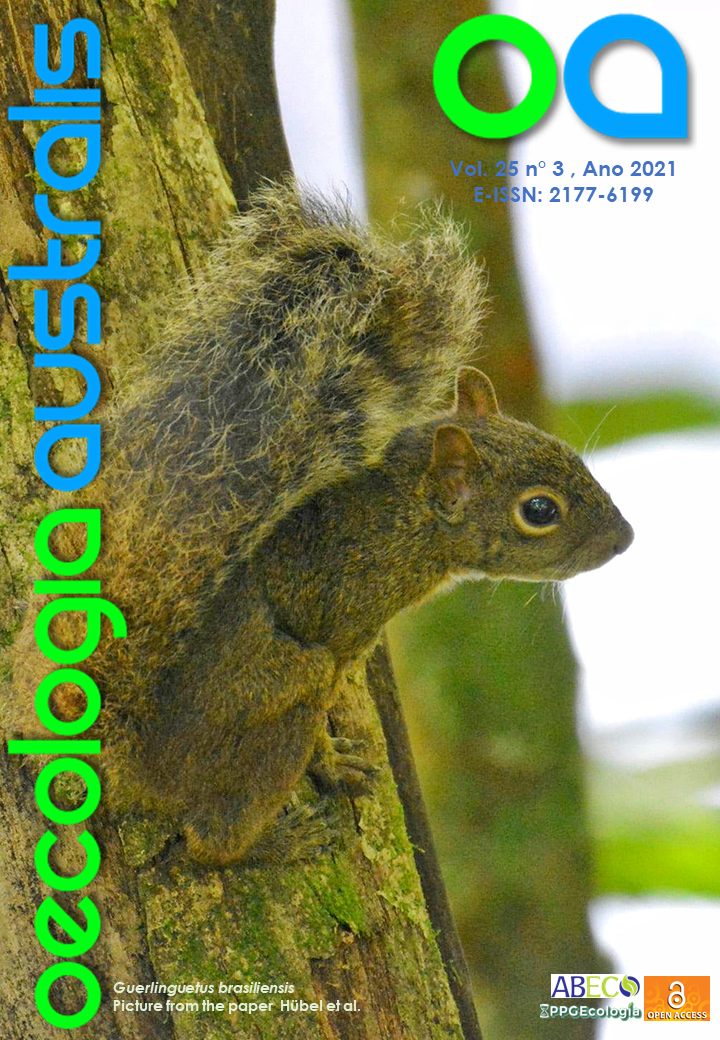IS OECOLOGIA AUSTRALIS PROMOTING GENDER EQUALITY IN ITS REVIEW PROCESS?
DOI:
https://doi.org/10.4257/oeco.2021.2503.01Keywords:
gender bias, sex bias, minority representation, ecology journalsAbstract
Following recent evidence on gender bias at the publishing process in sciences, we present here a view on Oecologia Australis section editors, reviewers, and authors gender ratios to understand the patterns in this journal, improving the data assessment and discussions on this topic. We found that women section editors tended to accept more women than men first-authored manuscripts. There was also a slight tendency of men editors to invite proportionally more men as reviewers. There was no difference in the gender of the first author on the submitted manuscripts, although there is a tendency of male co-authorship in men first-authored papers. Despite gender bias in the scientific academy being a global tendency, our data as a medium impact journal represents an important counter point and provides more information to support gender balance studies to foment better equalitarian policies.
Downloads
References
Araújo E. B., Araújo N. A. M, Moreira A. A., Herrmann H. J., & Andrade-Jr. J. S. 2017. Gender differences in scientific collaborations: Women are more egalitarian than men. PLOS One, 12(5), e0176791. DOI: 10.1371/journal.pone.0176791
Astegiano J., Sebastián-González E., & Toledo C. 2019. Unravelling the gender productivity gap in science: a meta-analytical review. Royal Society Open Science, 6 (6), 181566. DOI: 10.1098/rsos.181566
Barros C.S., & Guerra E. 2021. Editorial Oecologia Asutralis. Oecologia Australis 25(01).
Bendels M. H., Müller R., Brueggmann D., & Groneberg D. A. 2008. Gender disparities in high-quality research revealed by Nature Index journals. PLOS One 13(1): e0189136. DOI: 10.1371/journal.pone.0189136.
Bian L., Leslie S. J., & Cimpian A. 2017. Gender stereotypes about intellectual ability emerge early and influence children’s interests. Science. 355(6323), 389–391. DOI: 10.1126/science.aah6524
Brooks M. E., Kristensen K., van Benthem K. J., Magnusson A., Berg C. W., Nielsen A., Skaug H. J., Maechler M., & Bolker B. M. 2017. glmmTMB balances speed and flexibility among packages for Zero-inflated Generalized Linear Mixed modeling. The R Journal, 9(2), 378–400.
Budden A. E., Tregenza T., Aarssen L. W., Koricheva J., Leimu R., & Lortie C. J. 2008. Double-blind review favours increased representation of female authors. Trends in Ecology & Evolution. 23(1), 4–6. DOI: 10.1016/j.tree.2007.07.008
Calaza K. C., Erthal F. C. S., Pereira M. G., Macario K. C. D., Daflon V. T., David I. P. A., Castro H. C., Vargas M. D., Martins L. B., Stariolo J. B., Volchan E., & Oliveira L. 2021. Facing racism and sexism in science by fighting against social implicit bias: a Latin and Black woman perspective. Preprints. DOI:10.20944/preprints202101.0236.v1
Fox, C. W., Thompson, K., Knapp, A., Ferry, L. A., Rezende, E. L., Aimé, E. & Meyer, J. 2019. Double‐blind peer review - An experiment. Functional Ecology 33, 4–6. DOI: 10.1111/1365-2435.13269
Hammerschmidt K., Reinhardt K., & Rolff J. 2008. Does double-blind review benefit female authors? Frontiers in Ecology and the Environment 6(7):354. DOI: 10.1890/1540-9295(2008)6[354a:DDRFFA]2.0.CO;2
Hartig F. 2020. DHARMa: Residual diagnostics for hierarchical (Multi-Level/Mixed) regression models. R package version 0.3.3.0. https://CRAN.R-project.org/package=DHARMa
Langenberg, H. 2018. Convene to combat gender bias. Nature Geosciences, 11, 297. DOI: 10.1038/s41561-018-0123-7
Lerback, J., & Hanson, B. 2017. Journals invite too few women as referees. Nature, 541, 455–457. DOI: 10.1038/541455a
Loyola, R. 2020. Igualdade de gênero em revistas científicas só ocorrerá em dezoito anos. https://cienciafundamental.blogfolha.uol.com.br/2020/09/16/
Moss-Racusin C. A., Dovidio J. F., Brescoll V. L., Graham M. J., & Handelsman J. 2012. Science faculty’s subtle gender biases favor male students. PNAS 109(41), 16474–16479. DOI: 10.1073/pnas.1211286109
RCore team 2020. R: A Language and Environment for Statistical Computing. https://www.R-project.org/
Reuben, E. Sapienza, P., & Zingales, L. 2014. How stereotypes impair women’s careers in science. PNAS. 111(12), 4403–4408. DOI: 10.1073/pnas.1314788111
Staats C., Capatosto K., Wright R. A., & Contractor D. 2015. State of the science: implicit bias review 2015. Kirwan Institute. p. 96.


